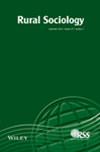Neo‐Rurals and Tourism in the Context of Rural Crisis in Southern Europe. Case Study in the Sierra de Aracena (Andalusia, Spain)
IF 1.9
3区 社会学
Q2 SOCIOLOGY
引用次数: 0
Abstract
The role of newcomers in the contemporary rural world has been widely studied, but the variability of profiles they present (amenity migrants, classic economic immigrants, neo‐rurals…) suggests that not all these actors have the same effects on the rural world and its crises. This article examines specifically how neo‐rurals—a population that is politically committed to sustainable rural development—influence the socio‐environmental, socio‐economic and socio‐identity issues surrounding the rural crisis through their engagement with tourism, a key activity in shaping the rural world in southern Europe. To do this, we present an ethnographic case study conducted in Fuenteheridos, a village in the Sierra de Aracena (Andalusia, Spain) that has a significant neo‐rural population and a developed tourism sector. This case study allows us to reflect on the differential effects of neo‐rurals on the rural crisis.南欧农村危机背景下的新农村与旅游。西班牙安达卢西亚阿拉塞纳山脉案例研究
新移民在当代农村世界中的作用已经得到了广泛的研究,但他们所呈现的特征(便利移民、经典经济移民、新农村……)的可变性表明,并非所有这些参与者对农村世界及其危机都有相同的影响。本文专门研究了新农村人口——在政治上致力于农村可持续发展的人口——如何通过参与旅游业(塑造南欧农村世界的关键活动)来影响围绕农村危机的社会环境、社会经济和社会认同问题。为此,我们在西班牙安达卢西亚阿拉塞纳山脉(Sierra de Aracena)的一个村庄富恩特赫里多斯(Fuenteheridos)进行了一项人种学案例研究,该村庄拥有大量新农村人口和发达的旅游业。这一案例研究使我们能够反思新农村对农村危机的不同影响。
本文章由计算机程序翻译,如有差异,请以英文原文为准。
求助全文
约1分钟内获得全文
求助全文
来源期刊

RURAL SOCIOLOGY
SOCIOLOGY-
CiteScore
4.60
自引率
13.00%
发文量
47
期刊介绍:
A forum for cutting-edge research, Rural Sociology explores sociological and interdisciplinary approaches to emerging social issues and new approaches to recurring social issues affecting rural people and places. The journal is particularly interested in advancing sociological theory and welcomes the use of a wide range of social science methodologies. Manuscripts that use a sociological perspective to address the effects of local and global systems on rural people and places, rural community revitalization, rural demographic changes, rural poverty, natural resource allocations, the environment, food and agricultural systems, and related topics from all regions of the world are welcome. Rural Sociology also accepts papers that significantly advance the measurement of key sociological concepts or provide well-documented critical analysis of one or more theories as these measures and analyses are related to rural sociology.
 求助内容:
求助内容: 应助结果提醒方式:
应助结果提醒方式:


